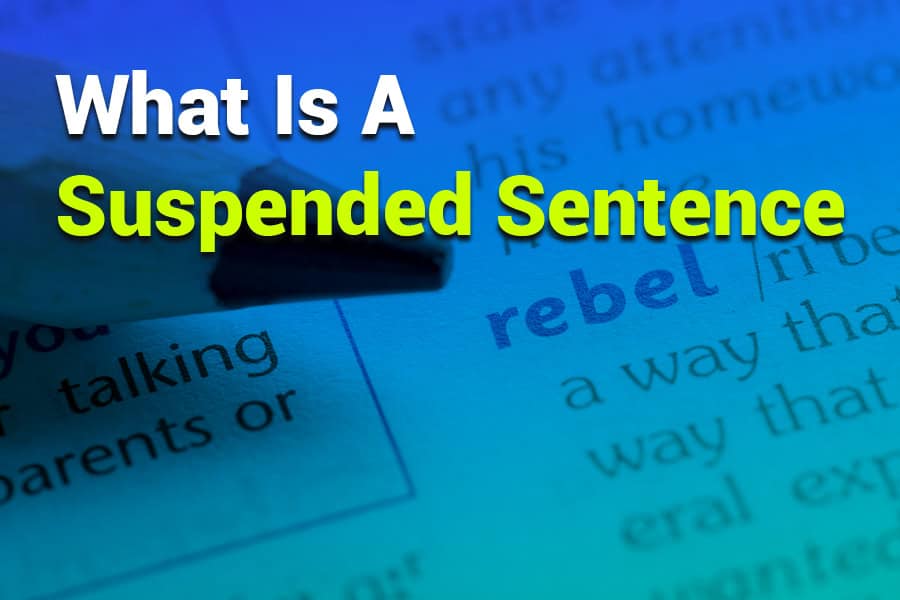A suspended sentence is a legal decision where a court delays or “suspends” the serving of a jail term, provided the offender meets specific conditions. It acts as a second chance for defendants, allowing them to avoid incarceration if they comply with the court’s guidelines. This concept of conditional leniency is common in criminal justice, intended to rehabilitate rather than punish when circumstances permit. This article explores what a suspended sentence involves, how it works, and how it influences the criminal justice.
What Is a Suspended Sentence?
A suspended sentence is a legal mechanism that allows courts to delay an offender’s jail term under certain conditions. Typically, it’s given to first-time or minor offenders, allowing them to avoid incarceration if they adhere to specific requirements like community service or probation. If the individual violates these terms, the suspended sentence may be activated, and jail time could follow. This structure enables courts to offer rehabilitation over punishment when possible.
What Is a Suspended Sentence? An In-Depth Explanation
Definition and Purpose of Suspended Sentences
A suspended sentence is a criminal justice outcome that postpones jail time under conditional terms. It’s primarily used for minor or first-time offenders as an opportunity to avoid incarceration by complying with specific guidelines set by the court. This system provides a balance between justice and rehabilitation, helping offenders reintegrate into society without enduring a jail sentence, assuming they adhere to the conditions.
Key Characteristics of Suspended Sentences
Suspended sentences vary depending on the case and the judge’s discretion but usually involve a probation period, court monitoring, and potential obligations like community service or counseling. The sentence remains suspended as long as the offender complies, serving as a deterrent against future offenses. This method is viewed as a more lenient approach for those with minimal criminal history.
Comparing Suspended Sentences to Probation
While similar, probation and suspended sentences have distinctions. Probation is typically a standalone sentence, while a suspended sentence often serves as a conditional delay to incarceration. Both share the goal of rehabilitation but differ in application and legal consequences.
Types of Suspended Sentences
Conditional Suspended Sentences
A conditional suspended sentence requires the defendant to fulfill specific conditions, such as attending counseling sessions, adhering to probation rules, or completing community service hours. Failure to meet these conditions can result in the reinstatement of the original sentence.
Unconditional Suspended Sentences
An unconditional suspended sentence does not require additional conditions, and the defendant is not placed under supervision. This type generally applies to minor infractions where the court believes the defendant poses little risk of reoffending.
Key Differences Between Conditional and Unconditional Suspended Sentences
Conditional sentences are more common and have a structured support framework. Unconditional sentences, while rare, indicate a greater level of court trust in the defendant’s future behavior. Both forms demonstrate the court’s flexibility in sentencing based on the offender’s history and the crime’s severity.
Legal Factors That Influence Suspended Sentences
Defendant’s Criminal Record
The criminal history of a defendant significantly affects the likelihood of receiving a suspended sentence. First-time offenders are more likely to benefit from this option than repeat offenders, as courts are more willing to offer leniency to those without a criminal record.
Nature of the Offense
Suspended sentences are often granted for non-violent and minor offenses, such as petty theft or minor drug charges. Violent crimes or those involving significant harm to others rarely qualify for suspended sentences, as courts view them as too serious for conditional leniency.
Court Jurisdiction and Judge’s Discretion
The availability and criteria for suspended sentences may vary based on local laws and the judge’s discretion. Some jurisdictions may apply stricter guidelines, limiting the types of cases that qualify for suspension.
Conditions Attached to a Suspended Sentence
Community Service Requirements
Many suspended sentences involve mandatory community service, which serves as a constructive penalty while benefiting the community. Offenders may need to complete a specified number of hours within a certain timeframe.
Attendance in Rehabilitation Programs
For offenses related to substance abuse, courts may mandate attendance at rehabilitation or counseling sessions. This helps address the root cause of the criminal behavior and encourages a sustainable recovery path.
Regular Reporting and Probation Compliance
Defendants may need to report regularly to a probation officer and adhere to the court’s rules. This includes avoiding illegal activities, maintaining employment, and following a structured routine. Probation officers ensure compliance and report any violations to the court.
Potential Benefits and Drawbacks of a Suspended Sentence
Advantages for Offenders and Society
Suspended sentences allow offenders to avoid incarceration, thus maintaining employment and family ties. From a societal perspective, they reduce prison overcrowding and emphasize rehabilitation, which can lower recidivism rates.
Limitations and Risks of Suspended Sentences
A suspended sentence requires careful compliance with court-mandated conditions. For some offenders, adhering to these conditions may be challenging, especially if they lack support networks. If violated, the sentence can be activated, leading to immediate incarceration.
Balancing Justice and Rehabilitation
Suspended sentences reflect the court’s attempt to balance justice with rehabilitation. While they provide an alternative to prison, they still impose significant responsibilities on the offender. This balance helps support reintegration while still holding offenders accountable.
How Suspended Sentences Are Enforced?
Role of Probation Officers in Monitoring Compliance
Probation officers play a critical role in ensuring offenders comply with the terms of their suspended sentences. They monitor behaviors, provide support, and report any violations to the court, which can lead to revocation of the suspended sentence.
Consequences of Non-Compliance
Failure to meet the conditions of a suspended sentence can result in a re-evaluation by the court, potentially leading to the enforcement of the original jail term. Courts take violations seriously, and offenders may face additional penalties if they disregard the terms.
Rehabilitation as Part of Enforcement
Suspended sentences often incorporate rehabilitative elements like counseling and community service. These conditions aim to reform offenders, reducing their likelihood of reoffending and supporting a constructive role in society.
Conclusion
A suspended sentence offers a unique pathway within the criminal justice system, providing offenders with an opportunity to avoid jail time under specific conditions. By balancing accountability and rehabilitation, suspended sentences serve as both a deterrent and a tool for reintegration. While they present an alternative to traditional incarceration, they come with strict conditions that require discipline and compliance. Understanding the nuances of a suspended sentence can help individuals navigate the legal system more effectively and make informed decisions if they face criminal charges.
FAQ’s
Q. What Is a Suspended Sentence and How Does It Work?
A. A suspended sentence is a legal outcome where the court delays jail time under specific conditions. If the offender complies with these conditions, they can avoid incarceration. Non-compliance, however, may activate the sentence.
Q. Can a Suspended Sentence Be Issued for Any Crime?
A. Suspended sentences are usually reserved for non-violent and first-time offenses. Serious crimes like violent or sexual offenses are less likely to qualify due to their severity.
Q. What Happens if Someone Violates a Suspended Sentence?
A. If the conditions of a suspended sentence are violated, the court may reinstate the original jail term. Probation officers report non-compliance, which can lead to immediate enforcement of the suspended sentence.
Q. How Does a Suspended Sentence Compare to Probation?
A. A suspended sentence is a postponed jail term contingent on meeting certain conditions. Probation is a separate sentencing option that involves supervision without a suspended jail term.
Q. Can You Get a Suspended Sentence for a DUI?
A. In some jurisdictions, minor DUI offenses may qualify for a suspended sentence, especially for first-time offenders. However, each case is evaluated individually based on risk and prior history.








